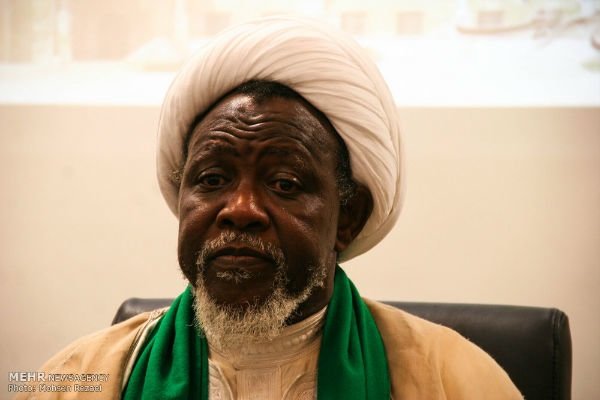Why Nigerian govt. so afraid of Sheikh Zakzaky?


Last week, on the day of Arbaeen, thousands of Islamic Movement in Nigeria (IMN) supporters took part in a series of peaceful protests in the Nigerian capital Abuja to demand the release of their incarcerated leader Sheikh Ibraheem Zakzaky. Nigerian security forces used live ammunition to crush the protest, leading to the death of at least 50 people.
Human rights groups quoting eyewitness testimonies said the Nigerian military dispersed peaceful gatherings by firing indiscriminately without warning, in blatant violation of the international and Nigerian law. Muhammadu Buhari government, despite the global outcry and court orders, continues to keep IMN leader Sheikh Zakzaky behind bars.
Oluyemi Fasipe is a Nigerian political analyst, social activist, and communication strategist. In an interview with Tehran Times, he talks about the latest army crackdown on the supporters of IMN and the horrendous atrocities unleashed on Nigerian Shias by the Buhari government, backed by Western and Arab powers.
Following are the excerpts:
Nigerian police at the behest of Buhari government carried out another gory massacre against Shiites on the day of Arbaeen this year. Can you tell us exactly what happened?
The army claimed that the Shiites attacked their convoy that was escorting ammunitions and attempted to overpower them, but the video circulated online only shows the army shooting at them while they run away. The Nigerian Shiites are known for peaceful protests.
Nigerian army cited a video of US President Donald Trump, in which he said soldiers should respond with force to migrants throwing stones, to justify opening fire on the supporters of the Islamic Movement in Nigeria. How would you react to that?
I have never been more embarrassed as a Nigerian. In the purported video of Trump, he was talking about Mexican immigrants trying to cross into the US illegally and he later backtracked on it. The Nigerian Army has no justification whatsoever to shoot at and kill unarmed protestors simply because they belong to a Muslim sect different from that of the President. There can be no justification to it whatsoever.
Contrary to the claims of Nigerian authorities, Amnesty International said the protestors were unarmed, calling on the US and Nigerian governments to abide by international human rights law. Do you think the international community needs to put more pressure on the Buhari government?
Yes, but whether it will yield any results different from what we have witnessed in the last three years is another thing entirely.
Sheikh Ibraheem Zakzaky is still in prison despite a 2016 High Court ruling ordering his unconditional release. On what grounds is the Nigerian government justifying his continued incarceration?
The three arms of the Nigerian government distrust each other, go against each other and have worked over the years to sabotage any semblance of synergy between each other. The executive government justifies Zakzaky’s continuous incarceration by alleging that the judiciary has been compromised and lacks the credibility to pass judgments that are for the good of the country. The judiciary holds similar sentiments towards the legislative and executive and vice versa.
Why is the Nigerian government so afraid of Sheikh Zakzaky and the Islamic Movement in Nigeria?
Nigerian politicians, especially those from Northern extraction, view Shia Islam as a threat to the majority Sunni Islam. This isn’t peculiar to Nigeria. Globally, Shia Muslims are not generally viewed positively. In Nigeria, they have been accused of not recognizing the Nigerian state and of trying to run a parallel government. There is also the fear of Sunni Muslim youth in Nigeria being converted to Shia Islam.
We all know their history and conflicts over the years. This escalation of hostilities is as a result of the emergence of a Sunni bigot as Governor of Kaduna State the umbrella body of followers of terrorism-enabled Wahhabism in Nigeria (JIBWIS) made a Press Release where they fraudulently claimed that “Shiites will hide under the cover of celebrating the Birthday Anniversary of Prophet Muhammad (sa) to foment crisis”.
These bloodthirsty Wahhabi barbarians are the final stage incubation of #ISIS, #AlQaeda and #BokoHaram terrorism. Whatever the ISIS barbarians believed in these bloodthirsty savages also believed in it. They are one and the same.
Every year the Islamic Movement in Nigeria under the leadership of Sheikh Ibraheem Zakzaky uses the occasion of the Birthday Anniversary of Prophet Muhammad (AS) to mark #Unity Week. A week dedicated to enhance and strengthen the bond of Islamic brotherhood among all Muslims.
But we all know that bloodthirsty Wahhabi barbarians are against the celebration of the Birthday Anniversary of Prophet Muhammad (AS). Though the same savages celebrate the Birth Anniversary of Saudi Arabia!
Nigerians Wahhabis want to use the fraudulent security breach of instigate security forces to attack the Yearly Unity Week of the Islamic Movement. We all know how extremely intolerant Wahhabis are.
Nigerians should disregard this intolerant Press Release by the Wahhabi gang.
Interview by: Mohammad Fatemizadeh
Source: Farsnews







